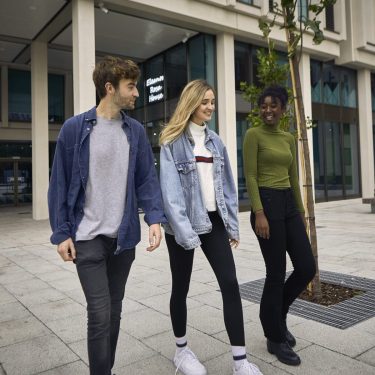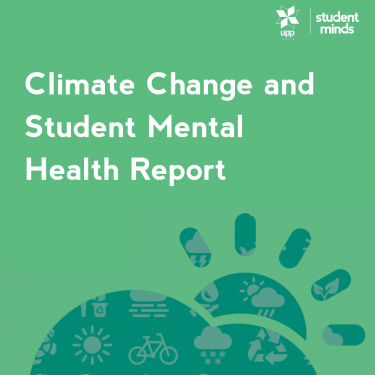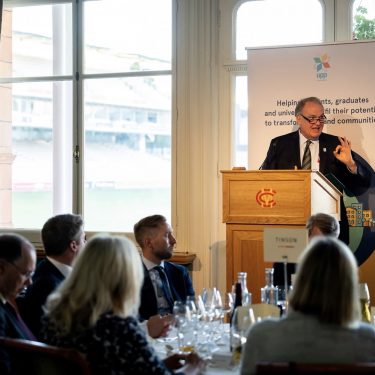The UPP Foundation Student Futures Commission, chaired by Mary Curnock Cook CBE and including some of the most influential names in higher education, has called for joint action between universities and students to tackle problems caused by the pandemic. The Commission’s final report, published today (Monday 14th February) provides a blueprint for how universities and students can work together to develop Student Futures Manifestos, which set out concrete actions to improve students’ experience of university.
Through its evidence gathering, the Commission report sheds new light on the future of teaching and learning in higher education, the importance of helping students regain their sense of ‘belonging’ to their university, and the need for clearer pathways to graduate outcomes. It sets out six key themes for student futures:
- Support for students before they reach university
- An induction into university life for each year of study
- Support for mental health and wellbeing
- A clear outline of the teaching students will receive and the necessary tools to access it
- Activities inside and outside the curriculum that build skills, networks and communities
- A clear pathway towards graduate outcomes
The Commission hopes that the production of the Manifesto will help give the sector a clearer focus on the priorities of students, and to better communicate and champion its commitments to successful student futures.
The report includes results from a poll of more than 2,000 university students and recent graduates that demonstrate the scale of the challenges facing higher education institutions as they navigate out of the coronavirus crisis.
- 73% of students reported that the pandemic had a very or somewhat negative impact on their mental health;
- 57% of students said the pandemic had a negative impact on the knowledge they needed to succeed on their course;
- 52% of students felt they were somewhat or much below where they personally expected to be in their academic studies;
- 90% of students said they strongly or somewhat prefer in person teaching where content is also recorded;
- Only 33% of students said they were slightly or very satisfied with the support their university had provided to help them find a job or work experience over the last 12 months.
The Commission report has called on universities to commit to developing and publishing a Student Futures Manifesto, with their students, by the end of the 2022/23 academic year.
Chair of the Commission, Mary Curnock Cook CBE said: “A Student Futures Manifesto, co-created and co-owned by students and their university, will be a powerful expression of intent about what students need to support successful lives and careers. We acknowledge the tragedy and disruption of the pandemic, but our proposals are resolutely optimistic and build on the extraordinary resilience and creativity demonstrated by colleagues and students across the sector during the crisis.”
The Commission is further calling for three broader areas of work:
- A new sector technology infrastructure strategy, led by Jisc, to accelerate the shift to modern digital systems, ensuring the increased use of digital tools is sustainable and cost effective.
- A review of online teaching and assessment, commissioned by an independent body such as Advance HE, at a national level to establish best practice for mixed-mode and digitally enhanced delivery.
- A new, targeted challenge fund, funded by Government and run by the Office for Students, to support student mental health and wellbeing
Richard Brabner, Director of the UPP Foundation and Student Futures Commissioner said: “Students have been selfless in putting the needs of others above themselves during the pandemic. Our report then, is a clarion call to put their needs first. We can do that by rebuilding the student experience based on a true partnership between universities and their students, prioritizing what students really want, not what we think they want. And for Government to provide a step change in funding to tackle the student mental health crisis.
Over the coming weeks the UPP Foundation will be asking universities and Students’ Unions to commit to developing a Student Futures Manifesto, and the Commission’s findings will inform its ongoing grant giving strategy to enable student and graduate success.”
[ENDS]
Notes:
- The UPP Foundation was created in 2016 by University Partnerships Programme (UPP), the leading provider of on campus student accommodation infrastructure and support services in the UK. The UPP Foundation is a registered charity that offers grants to universities, charities and other higher education bodies.
- The UPP Foundation established the Student Futures Commission in partnership with Shakespeare Martineu, Group GTI, and Wonkhe. The Commission has brought together evidence from across the higher education sector, students and students’ unions, experts from secondary education, graduate employment and representatives from the charity and voluntary sector. This included formal oral evidence sessions, written evidence, and two comprehensive polls of UK higher education students. Further information can be found on the Commission’s website: https://upp-foundation.org/student-futures-commission/
- UPP Foundation Student Futures Commissioners
- Chair: Mary Curnock Cook CBE
- Richard Brabner – Director, UPP Foundation & ESG
- Professor Colin Bailey CBE – President and Principal, QMUL
- Mark Blythe – Founder and Chairman, Group GTI
- Anne-Marie Canning MBE – Chief Executive, The Brilliant Club
- Professor Juliet Foster – Dean of Education, IoPPN, KCL
- Professor Becky Francis – Chief Executive, EEF
- Hillary Gyebi-Ababio – Vice President HE, NUS
- Stephen Isherwood – Chief Executive, Institute of Student Employers
- Smita Jamdar – Partner and Head of Education, Shakespeare Martineau
- Alistair Jarvis CBE – Chief Executive, Universities UK
- Dr Omar Khan – Director, TASO
- Nikita Khandwala – Head of Growth, Coleap
- Mark Leach – Founder, Editor in Chief and Chief Executive, Wonkhe
- Kate Owen – Chief Marketing Officer, UPP
- Meg Price – Development Consultant, NUS Charity and former President Worcester Students’ Union
- Professor Lisa Roberts – Vice Chancellor, University of Exeter
- Professor Mary Stuart CBE – Emeritus Vice Chancellor University of Lincoln & Director of Leadership Development, Minerva UK
- The polling for the Commission was carried out via Group GTI’s Cibyl database of 1.5 million UK students from 140+ universities across all year groups, ethnicities, gender, sexuality and socio-economic profiles. Cibyl were used as a research partner, to support with research design, survey programming, responses collection and data processing. The poll survey 2094 students as was wn weighted by gender and international status combined, and used HESA (Higher Education Statistics Agency) for the population numbers for full-time UK students. The full tables can be found at http://upp-foundation.org/wp-content/uploads/2022/02/October-UPPF_Weighted.xlsx
Endorsements:
—
ENDORSEMENTS FOR THE STUDENT FUTURES COMMISSION REPORT: A STUDENT FUTURES MANIFESTO
Michelle Donelan MP, Higher and Further Education Minister said: Building back a better experience for students who have been affected by the pandemic is deeply important to me and I welcome the contribution that this report from the UPP Foundation Student Futures Commission makes to the discussion.
“Every single student deserves to enjoy a first-class experience in our world-class higher education sector and I am pleased to see there is a focus on challenges that can often be overlooked, such as the transitions between years of study”.
Professor Sir Chris Husbands, Vice Chancellor Sheffield Hallam University said:“The six themes in this report are spot on: well thought out and crisply expressed. They provide clear pointers for a sector thinking its way into what will be a very different future. I will cut and paste them for my own team as we continue to navigate our way forward from the pandemic”
Alistair Jarvis CBE, Chief Executive of Universities UK said: “The pandemic has had a profound impact on students. This important report is a call to action for universities to work with students to produce a Student Futures Manifesto – a powerful statement of intent that will embed collaboration between students and universities to take actions to support wellbeing, learning and employability. I hope it will provide a useful framework to bring more of the good work that is already going on in universities to the surface and celebrate a renewed focus on the student experience.”
Dr Tim Bradshaw, Chief Executive of the Russell Group, said: “A high-quality education is just one part of a successful university experience and our universities work hard to support students in all kinds of ways throughout their studies – from helping them settle in from day one to providing careers guidance – so they have a positive experience and can succeed in whatever path they choose. The impact of that work can be seen in the high levels of continuation rates, progression into skilled careers and future earnings for students at Russell Group universities. Every part of society has felt the effects of the pandemic, including students, and universities are responding to that challenge, finding new ways to support them so we welcome this work by the Student Futures Commission and will consider its findings carefully.”
Rachel Hewitt, Chief Executive, MillionPlus said: “Modern universities have long gone to great lengths, both prior to and during the pandemic, to prioritise student welfare, to ensure that every learner is best able to make the most of their studies and wider university experience. This is just one part of the role these universities play in promoting social justice. It is important though that providers never rest on their laurels, particularly given the significant impact of the pandemic, and so MillionPlus welcomes the work of the commission and we’ll consider carefully the recommendations of this important report.”
Vanessa Wilson, Chief Executive, University Alliance said: “This important research throws into sharp relief the extraordinary difficulties that students have experienced throughout the Covid-19 pandemic. The impact of Covid-19 on student mental health has clearly been seismic. Alliance universities have always been deeply invested in the wellbeing of their students but given the scale of the challenge, we echo the commission’s call for government investment to support these efforts. Over the course of the last two years, University Alliance members have risen to the challenge to deliver teaching and learning outcomes for their students. The scale of this endeavour should not be underestimated. University staff and leaders have gone continually above and beyond to deliver for their students. Whilst a return to face-to-face teaching has always been a priority for Alliance Universities, we recognise too that there are clear and tangible benefits to a curriculum that embraces digital enhanced learning. Alliance universities are committed to working in partnership with students to shape delivery and support models that are fit for the future.
Professor Malcolm Press CBE, Vice Chancellor Manchester Metropolitan University said: “I welcome the Student Futures Report; it is an excellent compendium of good practice and captures exactly what we should be doing for and with our students in any case”
Professor Lisa Roberts, Vice Chancellor and Chief Executive at the University of Exeter said: “It has been a privilege to have been part of the Student Futures Commission, which has led to the creation of a highly insightful, evidence-based report. The wide-ranging case studies demonstrate just how much the sector has risen to the challenges of the pandemic, applying ingenuity and innovation to safeguard the student experience and student outcomes during this challenging time. However, we know there is much more to do to support our current and future students and I look forward to discussing the recommendations outlined in the report with our students and co-creating our plans”.
Professor Colin Bailey CBE, President and Principal Queen Mary University of London said: “I welcome this report from the Students’ Futures Commission. There is a real opportunity, as we emerge from the pandemic, for universities to reset their ambition to co-create with their students the best education and experience possible, to ensure students can achieve their full potential in an uncertain world. At Queen Mary University, this is our foremost goal.”
Alison Johns, Advance HE’s Chief Executive said: “We welcome the Student Futures Commission’s report and the recommendation for Advance HE to review ‘what works’ in effective online teaching and learning and assessment. This complements both our commitment in our Strategy 2021-24 to ‘Enhance teaching and learning for student and institutional success’, which specifically includes flexible teaching, learning and assessment strategies that optimise the use of emerging technologies, and our current work in Flexible learning in higher education”
Professor Andrew Wathey CBE, Vice-Chancellor and Chief Executive Northumbria University said: “This is a strong, original report which reinforces eloquently key points about the transferability of graduate skills, and about the criticality of modern IT systems to sustaining a real focus on the student interest”
Heidi Fraser-Krauss, Jisc CEO, said: “I wholeheartedly support today’s report by the UPP Foundation, which goes a long way to address the pandemic-related concerns and needs of students. I also welcome the Student Manifesto to help students rebuild their confidence, regain control of their studies and plan for a successful future after graduation. “The report is right to recommend action on tackling digital and data inequities. Jisc’s digital experience insights surveys of university students and academic staff showed the detrimental effect on teaching and learning experiences from not having access to reliable connectivity, technology and digital skills. “I will be keen to action any Jisc-related recommendations to help support universities in modernising digital infrastructure as well as digitally transform learning, teaching and assessment to improve the experiences staff and students seek. As we move towards established models of hybrid learning, we have an opportunity to transform education through technology. Never have digital, data and technology been so important in meeting the multiple challenges and opportunities that UK universities face.”
Meg Price, Development Consultant, NUS Charity and former President Worcester Students’ Union said: ‘The Student Futures Manifesto provides a clear, actionable call for universities to co-create change with students and students’ unions. Students’ unions are rightly demonstrated as key partners in the recovery from Covid ensuring that students are at the center of all aspects of change – “being worked with, not for”
Dr Diana Beech, CEO of London Higher said; “It is clear from the Commission’s report that the pandemic has led to a seismic shift in the way we work, and that includes universities and students. Supporting student mental health and wellbeing has become paramount to student satisfaction and success, as has investing in digital skills training. At London Higher, our Mental Health and Wellbeing Network provides an important space for higher education institutions across London to come together to share best practice and developments in wellbeing support. Our Wellbeing Connect toolkit developed during the pandemic allows students and staff at participating institutions to find appropriate support services in their local area at the time that they need them the most. We are proud that London is the best city in the world to be a university student, and we encourage all our members to continue working closely with their student bodies to create Student Futures Manifestos which will ensure the UK capital remains a supportive and compassionate student city for generations to come.”








